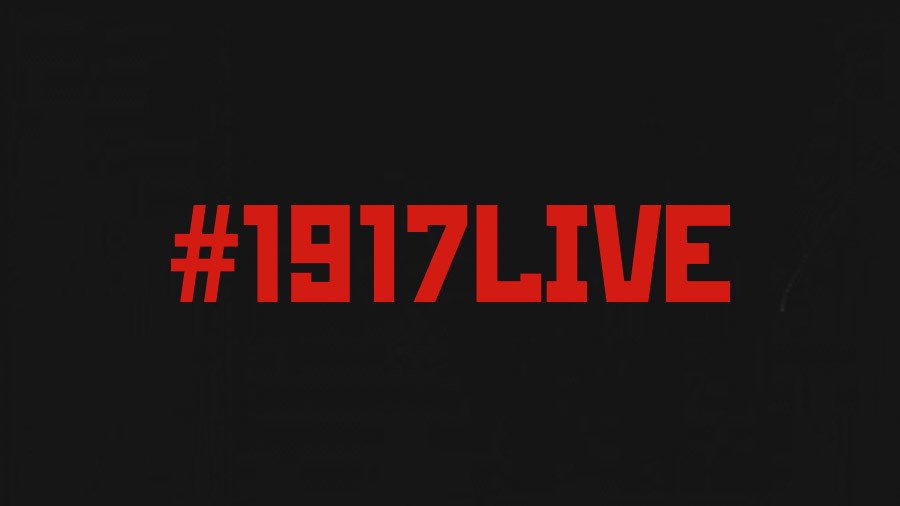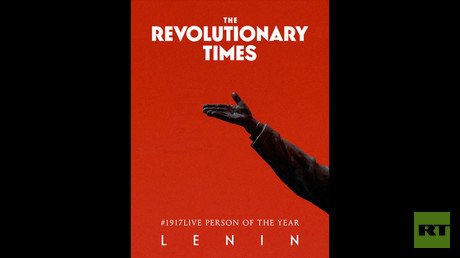‘So fascinating, so strange’: What the big hitters said about #1917LIVE

As the year-long live tweeting of one of the most innovative projects of the 20th century draws to a close, RT offers the best tweets from 250,000 followers, ranging from writers to politicians to CEOs.
Described as "nerdy but entertaining" by Mattias Fyrenius, the chief of Nobel Media which handles publicity around the coveted prize, it's unsurprising that the project initially found favour with academics already obsessed with Russia, and au fait with the army logistics crisis of 1917 - though many noted parallels with the turbulence of 2017.
Tweeting the Russian Revolution #1917LIVE gives a nod to present & Trump tweets by noting that strike leaders are "FIRED!"in all caps "Sad!" https://t.co/gNgIVvfNqw
— Theresa Fallon (@TheresaAFallon) 8 March 2017
It’s fascinating to follow the #1917LIVE project, watching big historical changes unfold on an incremental basis, tweet by RT from @RT_1917
— Katia Bowers (@kab3d) 26 February 2017
Watching our country's ruling class shake itself apart in front of us on Twitter really seems to prove how genius and meta RT's #1917Live thing was. https://t.co/5rIeamYbqj
— Our Hidden History (@OurHiddenHistry) 3 December 2017
#Lenin himself is live-tweeting the 1917 events from his grave, on the 100th anniversary of Russia's October Revolution #1989Lectureshttps://t.co/DG9SoCjvut
— Filipa Figueira (@FilipaFigueira) 8 October 2017
The story was quickly picked up by the media with dedicated articles by leading outlets, such as Corriere della Serra, and El Pais, as well as tweets from reporters in rival English-language publications who – unusually – did not mention Vladimir Putin, propaganda or Russian hacking.
This is being run by Russia Today, but so far I am enjoying the #1917live twitter thing. https://t.co/KIBiVkGGM9
— Chris Cook (@xtophercook) 9 April 2017
The entire @RT_com project of live tweeting the 1917 revolution is so fascinating and so strange.
— Chris Hayes (@chrislhayes) 8 May 2017
RT project tweeting 1917 revolution could get interesting in November, when Lenin declared political party "enemies of the people" https://t.co/FfK2xn9o6i
— Steven Dennis (@StevenTDennis) 7 March 2017
This is an intriguing project https://t.co/q27JFhmkf0
— Adam Taylor (@mradamtaylor) 7 March 2017
I disagree with a lot of your views, but that time you called Liberal intelligentsia "shit" was epic! 😉 https://t.co/QWYWABmNrh@VLenin_1917
— Nina ☦️ Byzantina (@NinaByzantina) 21 March 2017
Ho ho ho. And you thought NORAD's Santa tracker was scary. https://t.co/R1tOzDijbg
— Nathan Hodge (@nohodge) 9 April 2017
Soon, a dedicated following from politicians, likely fascinated by Vladimir Lenin's rise from exile to one of the most powerful men in the world in the space of less than a year, or – just as usefully – Tsar Nicholas II's equally rapid downfall.
100 years since the collapse of the Russian Empire in the chaos and terror of its revolutions. Follow Twitter versions at #1917LIVE.
— Carl Bildt (@carlbildt) 30 January 2017
#Lab17 clearly taking inspiration from #1917LIVE as well as 1970s https://t.co/F1oKdSwD2y
— Harriett Baldwin (@hbaldwin) 28 September 2017
But the biggest endorsement came when prominent public figures either began interacting with various revolutionary characters, or role-playing themselves. Such as British writer Helen Rappaport, who became the captive Romanov sisters, and Paulo Coelho, who took on the persona of doomed spy Mata Hari.
To cheer us up and as a way of passing the cold dark winter days our tutor Mr Gibbes has suggested we perform some one-act French plays. Maria and @AlekseiNR_1917 are rehearsing one with Monsieur Gilliard. Tatiana and Anastasia will be in the other one #1917LIVEpic.twitter.com/V9higiAHPV
— The Romanov Sisters (@OTMA_1917) 17 December 2017
I am ready. #1917LIVE
— Mata Hari (@Mata_Hari_1917) 15 October 2017
You can read our other end-of-year #1917LIVE features here, here and here, or re-live the project by typing in the hashtag into Twitter.














